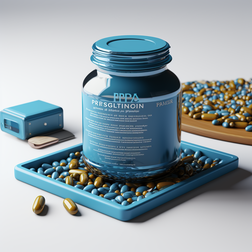Can you develop a tolerance to viagra?
- Understanding Viagra and its Effects
- Psychological Dependence and Misuse of Viagra
- Can you Develop a Tolerance to Viagra?
- Factors Affecting Viagra's Effectiveness Over Time
- Vascular Problems, High Blood Pressure, and Diabetes: Implications for Viagra Use
- How Viagra Works: The Role of Blood Flow in Erections
- Comparison with Other Oral Erectile Dysfunction Drugs
- Side Effects of Long-Term Use of Viagra
- Alternative Treatments and Approaches for Erectile Dysfunction
- Proper Usage and the Importance of a Prescription for Viagra

Understanding Viagra and its Effects
Viagra is a brand name for the drug sildenafil, primarily prescribed to treat erectile dysfunction (ED). By enhancing the body's response to sexual stimulation, it aids in achieving and maintaining an erection. However, the drug does not induce sexual arousal itself; rather, it functions in response to it. It usually starts working within 30 to 60 minutes of consumption.
Psychological Dependence and Misuse of Viagra
Viagra is intended to be used as a treatment for ED. However, some people misuse it, using it recreationally without a prescription, or believing that it will enhance sexual performance. This can lead to a psychological dependence where a person believes they can't perform sexually without it, even though they don't have ED. It's important to note that this is not a physical addiction, as the body doesn't develop a tolerance to Viagra.
Can you Develop a Tolerance to Viagra?
One of the most frequently asked questions is whether one can develop a tolerance to Viagra over time. The answer is that it's highly unlikely. The drug's mechanism of action doesn't lead to physical dependency or tolerance over time. However, the effectiveness of Viagra can be influenced by several factors, which we'll explore next.
Factors Affecting Viagra's Effectiveness Over Time
Viagra's effectiveness can decrease over time if underlying health conditions worsen. Vascular problems, high blood pressure, and diabetes can all make ED more severe, thus making Viagra less effective. Furthermore, lifestyle factors like obesity, smoking, and alcohol use can also negatively impact Viagra's efficacy. Therefore, maintaining overall health is vital for the effectiveness of this medication.
Vascular Problems, High Blood Pressure, and Diabetes: Implications for Viagra Use
All these conditions impact blood flow, which is essential for achieving an erection. In the case of vascular problems and high blood pressure, blood vessels can become narrow or harden, limiting blood flow. Diabetes, on the other hand, can lead to nerve damage, affecting the signals between the brain and the blood vessels in the penis. Thus, these conditions may reduce the effectiveness of Viagra over time, not because of developed tolerance, but due to the progression of these conditions.
How Viagra Works: The Role of Blood Flow in Erections
Viagra works by relaxing the smooth muscles and dilating the blood vessels in the penis, enhancing blood flow and enabling an erection in response to sexual stimulation. It achieves this by inhibiting an enzyme called phosphodiesterase type 5 (PDE5), which regulates blood flow in the penis.
Comparison with Other Oral Erectile Dysfunction Drugs
Viagra is one of several oral erectile dysfunction drugs available.
Others include Cialis (tadalafil), Levitra (vardenafil), and Stendra (avanafil).
While they all work in a similar way—by inhibiting PDE5—there are differences in how long they work and their side effects.For example, Cialis lasts longer than Viagra—up to 36 hours, compared to 4-5 hours for Viagra.
Side Effects of Long-Term Use of Viagra
While Viagra is generally safe for long-term use, it can have side effects, especially if misused. Some potential side effects include headaches, flushing, indigestion, nasal congestion, and impaired vision. In rare cases, it may cause priapism, a painful, long-lasting erection that requires immediate medical attention.
Alternative Treatments and Approaches for Erectile Dysfunction
For those looking for alternatives to Viagra, there are several options. Besides other oral ED drugs, there are also non-pharmaceutical treatments like vacuum erection devices, penile injections, and urethral suppositories. Furthermore, lifestyle changes—such as exercising regularly, maintaining a healthy weight, quitting smoking, and limiting alcohol consumption—can help improve ED.
Proper Usage and the Importance of a Prescription for Viagra
Viagra should be taken as prescribed by a healthcare professional. Taking more than recommended can lead to increased side effects and doesn't improve the drug's effectiveness. It's important to discuss all health conditions and medications with a doctor before starting Viagra, as it can interact with certain drugs and is not suitable for individuals with specific health conditions.
So, to answer the questions: No, you don't develop a tolerance to Viagra over time. However, its effectiveness can decrease if underlying health conditions worsen, and this drug's effectiveness can be influenced by other lifestyle factors. It's always best to consult with a healthcare professional for appropriate advice and treatment for ED.



